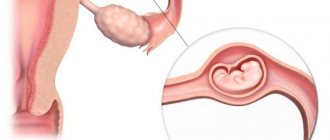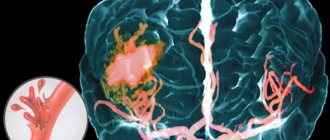How to independently determine infertility in men?
It is impossible to accurately determine male infertility at home, but we can assume the presence of this diagnosis based on some symptoms.
- First of all, you need to pay attention to the appearance of the ejaculate. In case of infertility, it becomes like thick, hard clots or thin white threads. Discharge after orgasm in case of infertility is often very small, and in some cases no sperm is released at all.
- Another symptom that may be a sign of illness is minor pain in the lower abdomen that appears after physical work. At the same time, the pain is not periodic, but constant.
- In the initial stages of male infertility, false urge to urinate is common, especially at night.
Which doctor should I contact for help?
As mentioned earlier, only a doctor can make an accurate diagnosis. If you suspect a disease, you should consult a urologist or andrologist. These doctors specialize in men's health and will help you make an accurate diagnosis. Most likely, the patient will need help from other doctors, for example, an endocrinologist.
In order to make an accurate diagnosis, a man will need to go through several diagnostic stages.
To begin with, the doctor conducts an initial survey of the patient. The characteristics of sexual life, previous operations and illnesses (their presence or absence) are taken into account. The doctor also recognizes possible negative factors that may affect the development of the disease (for example, living or working conditions).
After the interview, the doctor conducts a thorough examination and prescribes the necessary tests. In some cases, a man is sent for additional consultation to other specialists (geneticist, therapist, endocrinologist).
Stages of examination to help determine male infertility
When a question arises regarding infertility, the following also arises: “Which doctor should I contact?” First of all, you need to contact a urologist; after an initial examination and questioning, he will refer you for examination. This procedure includes several steps that will help determine whether a man is infertile or not.
- First stage. It includes the following procedures:
- Study of the patient's life, health and medical history. The doctor conducts a conversation with the man, looks at the tests that were taken earlier. Be sure to find out whether the man has previously had urological diseases, diseases of the reproductive system and whether the man has ever been treated for a sexually transmitted infection, as well as whether there are chronic diseases. It clarifies how long it takes for conception to occur, whether the partner had abortions, and so on. But you should understand that just studying the anamnesis will not be enough, and therefore it is necessary to take all the tests.
- Spermogram. It is mandatory. When changes in sperm are detected, it is recommended to carry out several repeated tests at least after two weeks.
- MAR test. Helps identify the exact number of sperm that are not suitable for fertilization. If the result exceeds more than 50%, then a diagnosis of “immunological infertility” is made.
- Linked immunosorbent assay. Helps determine the titer of antisperm antibodies.
- Consultation with an andrologist. Helps determine the severity of secondary sexual characteristics and examine the penis, testicles and mammary glands in a man.
- Cytological analysis. Provides reliable information about the distant urethra and seminal vesicles.
- Analysis for the detection of bacteria in the secretion of the prostate gland. Blood is also donated for biochemistry and general analysis, the blood type and Rh factor are determined. Analysis to determine the level of the male hormone - testosterone.
- Second phase. If after the first stage it was not possible to find out the causes of infertility, then the doctor prescribes the next stage, which includes:
- Analysis for follicle-stimulating hormone, luteinizing hormone, testosterone, sex hormone binding globulin.
- Ultrasound of the scrotum. Helps detect structural changes and pathologies of the appendages, testicles and prostate gland.
- TRUS method. Helps identify changes in the seminal vesicles.
- Doppler study.
- Enzyme immunoassay combined with polymerase chain reaction.
- Research at the genetic level.
- Sperm centrifugate examination.
- Study of urine obtained after ejaculation.
- Testicular biopsy.
Such an extensive examination will help determine the main cause that provoked male infertility, and will also help prescribe correct and effective treatment.
To avoid the risk of giving birth to an unhealthy baby, pregnancy must be carefully planned. And if you have any problems, you should definitely seek help and a full examination from a specialist. Tests will help show any abnormalities occurring in the body. Be sure to get tested with your partner before conceiving to make sure that you can conceive a child, and she can carry it to term.
What tests should a man undergo for male infertility?
First of all, a man needs to undergo a detailed blood and urine test. These tests help identify a wide range of inflammatory or chronic diseases.
The defining concept of the ability to procreate and create offspring is fertility. In a healthy body, it is at a consistently high level, starting from the moment of puberty and until the extinction of all body functions. The inability of a man to impregnate a woman is a physiological disorder, especially if the pathology occurs in the prime of life.
Causes of the disease
There are a variety of factors that can lead to infertility in healthy men - from temporary external influences to severe systemic diseases. First of all, it is necessary to highlight deviations in the functioning of the genitourinary system: sexually transmitted pathologies, chlamydia, prostatitis - all of them can cause dysfunction.
You also need to take into account the following diseases:
- complications of infectious diseases - mumps and rubella;
- diabetes;
- viral hepatitis;
- antisperm antibodies;
- exposure to various radiations and chemicals.
We are talking mainly about addiction to bad habits such as smoking and drinking alcohol. Also at risk are patients with obesity, a sedentary lifestyle and a lack of two components in the body - vitamin C and zinc.
About the effectiveness of home methods
To date, there are no reliable laboratory methods to determine infertility in men at home. However, there are some useful tips that can help you identify indirect signs of loss of fertility. A visual assessment of his ejaculate will help to understand whether a man is infertile. The following signs will indicate that sperm quality is below acceptable levels:
- excessive viscosity or wateriness;
- the presence of yellowish or other impurities;
- presence of lumps;
- appearance of whitish threads.
A significant symptom may be a dull and aching pain in the lower abdomen that appears after walking or physical activity. It can indicate varicocele, a pathology affecting the testicles. It is worth paying attention to such everyday disorders as frequent urge to urinate or a burning sensation during this process.
It is imperative that men who have a female body type: with wide hips, narrow shoulders and a characteristic distribution of subcutaneous fat need to be tested for infertility. In such a situation, we are talking about a systemic endocrine failure, due to which the body does not receive male hormones in the required volume.
Finally, it is strongly recommended to undergo a check-up or laboratory test if the orgasm after intercourse is not accompanied by ejaculation at all. Any of the listed pathologies is a reason to get tested for infertility in a situation where we are talking about a chronic manifestation and not a single disorder.
What you can see even at home
Can a man accurately test his fertility at home? No, of course, you cannot accurately determine the quality of sperm on your own. Clinical studies are needed to make a diagnosis. At home, you can only suspect health problems that are preventing you from conceiving a child. There is such a simple test for infertility in men - if at least one situation is suitable, then you need to go to the hospital and check the quality of sperm:
- A woman and a man want to have children, they make attempts to conceive, but there are no results for six months or more. At the same time, the woman checked her health, and no abnormalities were found in her body.
- The man's sperm has become different from normal: less ejaculate is released, the sperm has become more watery.
- The color of the sperm changed: it became yellow, green and brown. This clearly signals problems with the genitourinary system.
- Sometimes an erection does not result in the release of sperm.
- Bulging veins appeared in the scrotum area. This is a varicocele - varicose veins.
- The testicles changed shape, sagged, changed color, and became too hot to the touch.
The listed signs require immediate verification, since each of the described situations may mean the development of infertility in a man.
How to correctly determine infertility
To date, Western pharmaceutical companies have developed special home tests that allow you to check male semen for fertility. It’s hard to call this pleasure free, since all such kits cost comparable to laboratory tests.
However, the main disadvantage of these inventions is the lack of accuracy, which allows only an approximate assessment of the quality and activity of sperm in the ejaculate. For this reason, testing for infertility in men today should be carried out exclusively by professionals in special clinics.
In this case, all aspects of the functioning of the genitourinary system will be assessed, for which doctors resort to the following tests:
- spermogram;
- testing for sexually transmitted diseases;
- blood test for hormonal levels;
- Dopplerography of blood vessels in the pelvic organs.
Additionally, tests of urine and secretions produced by the prostate gland may be helpful. To objectively assess the condition of the prostate, you will also need to perform an ultrasound scan - for this it is best to insert the sensor rectally.
The importance of preventing infertility should not be underestimated. First of all, you need to pay attention to your own lifestyle and how well it corresponds to the concept of health. You can prevent the development of any diseases of the genitourinary system without much effort if you engage in sports or physical activity, eat right and do not abuse alcohol.
Male infertility is a pathological disorder in the reproductive system. The inability of a sexually mature man to conceive a child does not in any way affect his sex life or the presence of an erection.
The first sign of this problem is the absence of children in a couple who have been sexually active for a long period (up to 1 year) without contraception.
If a woman has a high ability to fertilize, confirmed by examination results, and pregnancy has not occurred during this time, a diagnosis of male infertility is made.
There are several methods for determining male fertility. This pathology can be recognized at home. Just first you need to get acquainted with the reasons for this condition.
Additional examinations
How to find out exactly about a man’s infertility? Sometimes it is necessary to check not only the spermogram, but also undergo a number of other tests:
- MAR test for male infertility - helps to determine antisperm antibodies (immune factor of infertility), which perceive sperm as foreign elements and destroy them.
- Study of the morphological state of sperm according to Kruger. If the spermogram showed a deviation in the structure of the sperm, then in order to study the anomalies in more detail, this check is carried out.
- Electron microscopy of spermatozoa (EMIS check). In essence, this is a more advanced spermogram, which is carried out on more technologically advanced microscopic equipment (with a magnification of 100,000 times).
- A test to check the acrosomal reaction of a man's sperm. Sometimes infertility occurs because sperm cannot penetrate the wall of the egg (this is called acrosomia). This test allows you to detect this sperm pathology.
- The TUNEL, COMET, SCSA test is a detailed study of sperm DNA. Using this analysis, it is possible to determine chromosomal (congenital and acquired) pathologies.
Testing for infertility in men is not free of charge in all clinics. Here is the approximate cost of procedures in paid departments:
- Spermogram – from 1550 rub.
- MAR test – from 1100 rub.
- EMIS – from 7500 rub.
- A test to check the acrosomal reaction - from 4800 rubles.
- TUNEL check – from RUB 8,200.
- Comprehensive infertility testing – from 12,000 rubles.
Causes of infertility in men
The following factors contribute to the development of male infertility:
- infectious diseases of the reproductive system;
- abnormal structure of the pelvic organs;
- anatomical features of the external genitalia;
- inflammatory processes and complications after serious illnesses;
- varicocele – varicose veins of the spermatic cord;
- hydrocele - a congenital pathology in which fluid inside the scrotum puts pressure on the testicle, disrupting the blood circulation in it and reducing sperm production;
- cryptorchidism is an abnormal deviation in the development of the reproductive system, when the testicles do not descend into the scrotum, but remain in the abdominal cavity of the man;
- hormonal disbalance;
- autoimmune mechanism;
- genetic and hereditary diseases;
- erectile dysfunction (impotence);
- premature ejaculation;
- ailments in which soft tissues of the whole body are damaged (tuberculosis, diabetes mellitus, liver cirrhosis, thyroid pathologies, mumps, and the like);
Common Causes of Infertility in Women
How to understand that you are infertile? Inability to conceive is not an independent disease. And the only sign of this condition is the absence of pregnancy for twelve months of regular intimate contact without contraception.
However, it should be remembered that infertility in girls is usually observed due to various disorders of the body, in particular the genital area. It develops due to ailments of an inflammatory nature, genetic abnormalities or congenital defects of the reproductive system. Surgery, hormonal imbalance, psychological stress and mechanical damage to the brain can also be factors that provoke the occurrence of this condition. After the age of thirty-five, all physiological processes in women proceed more slowly. It is much more difficult for them to conceive a child than for younger representatives of the fairer sex.
How to determine at home
Often men, for various reasons, cannot or do not want to undergo examinations in the clinic to confirm the diagnosis of infertility. But even at home, you can suspect a problem if a man monitors his health.
The following signs indicate the development of possible infertility:
- absence of pregnancy of one or more partners;
- change in sperm concentration - watery structure of sperm, the presence of white threads and thick lumps;
- change in the color of sperm - from transparent white it becomes yellow, greenish or even brown;
- lack of ejaculation after orgasm;
- swelling of the veins in the scrotum;
- frequent pain in the groin area;
- change in the shape of the testicles - they sag, stretch out, and their increased temperature is felt through the skin of the scrotum;
- female-type body hair;
- frequent urge to pee, especially at night.
If you notice one of the symptoms, you should immediately seek help from a specialized specialist - a urologist or andrologist. Timely treatment in 90% of cases guarantees a positive result and also prevents the occurrence of various unpleasant complications.
Types of male infertility
Male infertility is divided into 2 types:
- relative – the possibility of fertilization with one’s own sperm remains possible, only this process requires additional conditions;
- absolute – a man’s sperm is sterile, it does not produce sperm for conception.
According to physiological characteristics, fertility in men can take different forms. Let's look at them in more detail.
Secretory infertility. In medicine, this form of the disease is considered the most common. It is characterized by dysfunction of sperm production in the male reproductive system. As a result of pathogenic processes, the number of sperm changes, their motility and gene pool are disrupted.
The main causes of secretory infertility are varicocele and hydrocele. In both cases, blood circulation in the testes slows down, which leads to a decrease in sperm activity and even their death.
Mumps contracted in adolescence, cryptorchidism, an unfavorable environmental situation, and banal hot baths can cause secretory infertility in men.
Obstructive infertility. This form of the disease is characterized by the inability of sperm to move along the vas deferens. This can be either a congenital pathology or an acquired one. Only two factors contribute to the development of obstructive infertility - physical and chemical.
Therapy
After diagnosing female infertility and identifying the causes of infertility, the specialist selects treatment methods. Depending on the factors preventing conception, the doctor recommends the necessary means to eliminate them.
Some patients are prescribed medications to relieve inflammation, others are prescribed antibiotics, and others are prescribed medications containing hormones. Sometimes the situation is so serious that assisted reproductive technologies have to be used. Methods such as in vitro fertilization, artificial insemination, the use of donor biomaterial or the services of a surrogate mother allow many women to make the dream of having a child a reality.
The cause of male infertility may be sperm pathology.
Diagnosis of male infertility
There are several ways to determine infertility in men. First, it is necessary to exclude any pathological changes in the partner that may cause the impossibility of fertilization.
If everything is fine with the other half, the algorithm for examining a man looks like this:
- collecting information and familiarizing the doctor with the patient’s complaints;
- general examination and palpation of the scrotum;
- determining the frequency of sexual intercourse, erection and the nature of ejaculation;
- laboratory diagnostics, which includes infectious screening (if indicated), biochemical analysis of sperm, hormonal studies, ultrasound of the thyroid and genitourinary system, radiography.
- In the most severe cases, a testicular biopsy may be necessary.
Description of methods for determining infertility
How to determine infertility in a man? To do this, you need to undergo diagnostics. The examination algorithm includes collecting the patient’s medical history and complaints. The doctor examines existing chronic pathologies and a history of surgical interventions. Be sure to ask about the number of sexual partners, whether they are pregnant or not, and their method of contraception. Information about work is also important, since occupations involving chemicals can impair fertility.
Important: at your first visit to the doctor, a visual examination is performed. The doctor assesses the degree of development of secondary sexual characteristics, palpates the testicles of the scrotum, the dilation and tortuosity of the veins of the spermatic cord. A rectal examination of the glandular organ is performed to confirm or refute the presence of inflammatory processes.
An important step in diagnosis is the assessment of reproductive and sexual function. The doctor specifies the number of sexual intercourses per week, the hardness of the penis during an erect state, the nature of ejaculation - early, normal or delayed. Then it is recommended to take a spermogram. To do this, the man submits his seminal fluid to the laboratory. Today, spermogram appears to be the most informative diagnostic method. Sperm testing helps determine the following abnormalities:
- Low number of active sperm;
- Lack of sperm in seminal fluid;
- Reduced number of viable sperm;
- Low sperm count;
- Leukocyte surge (infection or inflammation);
- A large amount of seminal fluid;
- The presence of 50% of defective sperm, for example, having a doubling of the head, changes in structure, shape, etc.
If there is a suspicion of sexually transmitted infections, additional tests are prescribed. These include a smear from the urethral canal, PCR diagnostics to determine the type of specific pathogenic microorganism. A bacterial culture of the seminal fluid is also carried out (if bacteria or a large number of leukocytes are found in the semen), and prostatic juice is examined.
How to check for infertility in men? Often disorders are associated with hormonal imbalance in the male body. Hormonal studies are carried out to determine the concentration of testosterone, FSH, LH, prolactin, estradiol. The content of free radicals is assessed - excessive production damages the sperm membrane, impairs their motility, which reduces fertilizing ability.
For information: an important stage in diagnosing male infertility is the study of the acrosomal reaction - when the sperm comes into contact with the egg, chemical transformations are observed on its head, which allow it to dissolve the shell of the egg and, accordingly, penetrate inside. The acrosomal reaction occurs exclusively in sperm with normal morphology.
Electron microscopic examination of sperm and cytogenetic analyzes make it possible to detect the pathology of sperm structure, evaluate the contents of seminal fluid plasma, and determine the qualitative and quantitative characteristics of chromosomes. When chromosomal abnormalities are detected, genetic counseling is required to understand the cause of infertility.
How to test for infertility? In addition to the tests described above, instrumental diagnostics are recommended for men:
- Ultrasound of the thyroid gland.
- X-ray of the skull, sella turcica (manipulations are necessary to exclude a tumor process in the pituitary gland).
- Ultrasound transrectally and transabdominally. The structure and consistency of the testicles, epididymis, glandular organs, the condition of the seminal vesicles, and vas deferens are assessed.
- Dopplerography of the scrotum.
- Thermography of the scrotum (determines varicose veins).
- Testicular biopsy examination. This manipulation is carried out against the background of an idiopathic decrease in active sperm with normal testicular size and FGS concentration.
Treatment of male infertility
The first and most important rule in the treatment of male infertility is the correction of the disease that provokes fertility. After eliminating the cause of the disease, treatment begins.
You can get rid of male infertility using one of 3 methods: conservative, surgical and alternative. It all depends on the severity of the disease and its form.
- Strengthening therapy. You can improve the generative function of the testicles with a powerful vitamin boost in the form of Tocopherol and a group of multivitamins.
- Treatment of neuroses. Infertile men are very vulnerable; they are prone to prolonged depression, excessive irritability and severe fatigue. Phosphorus-rich drugs and, of course, consultation with a neurologist will help you cope with the situation.
- Therapy of secretory infertility. It consists of taking androgens to stimulate the secretion of gonadotropins, sperm motility, and increase their quantity and quality.
- Treatment of excretory infertility. Relieving the source of the problem with the genitourinary system leads to the restoration of the reproductive function of the male body. In parallel with drug therapy for prostatitis, urethritis or another similar disease, biological stimulation of metabolic processes in the body begins, which have a positive effect on a man’s spermatogenesis.
- Surgical treatment. This type of therapy is indicated for obstructive aspermia. The reasons for surgical intervention are quite serious: varicocele, cryptorchidism, vasostomy, resection of the prostate gland.
Another method of fertilization is modern reproductive technologies, namely IVF.
Diagnosed male infertility is not a death sentence. A thorough examination and adequate treatment will give the first results within a month. The main thing is not to delay your visit to the doctor, and then you have every chance to experience the joy of fatherhood.
How do you know if you can have children?
There is nothing better than seeing your baby's smiling face, hearing the patter of his feet around the apartment, or buying adorable tiny skirts in the baby department. However, not everyone has this happiness.
Approximately 15% of married couples in Russia are diagnosed with infertility. A marriage is considered infertile when pregnancy does not occur within a year of regular attempts to conceive (that is, sex without the use of any contraception).
What symptoms should alert you and become a reason to go to the doctor, says Sergei Aleksandrovich Yakovenko, embryologist, candidate of medical sciences, associate professor of the Department of Biophysics at Moscow State University, expert in the educational program “Happiness of Motherhood for Every Woman!”
So, check yourself for factors that may indicate infertility:
Problems with the menstrual cycle
The menstrual cycle is a very complex, multi-level, cyclical process. When a “breakdown” occurs at least at one level, the entire cycle is disrupted, and, as a result, problems with reproductive function arise. A regular menstrual cycle usually lasts from 21 to 35 days and usually indicates regular ovulation.
There are many menstrual cycle disorders. If a woman has an irregular cycle, too much or too little menstruation, or severe pain during this period, she simply needs to see a doctor. This will allow you to make a timely diagnosis and take the necessary measures to avoid problems with conception.
One cause for serious concern may be amenorrhea - the absence of menstrual bleeding. Amenorrhea for six months or more is usually considered a sign of lack of ovulation, which means that the chances of conception are reduced to zero.
It is also worth consulting a doctor in situations where menstruation is very scanty or too heavy. This may be caused by changes in the endometrium. This is also a very alarming symptom for those dreaming of having offspring.
Pain during menstruation
For many women, period pain is part of the normal menstrual cycle. However, if the pain is so severe that it interferes with leading a normal lifestyle, this deserves special attention and examination. In particular, it may be a symptom of the already mentioned endometriosis, which negatively affects the ability to conceive.
Hormonal imbalance
Persistent acne, oily skin and excess hair growth in a woman may be signs of excess androgen (male sex hormone) production. The most common cause of androgen excess in women is polycystic ovary syndrome (PCOS). In this disease, the ovaries contain a large number of cysts (cavities filled with fluid) that do not contain eggs. Such a diagnosis is a red light for the desired pregnancy to occur.
Nipple discharge
Pay attention to fluid discharge from one or both nipples. This may be a symptom of hyperprolactinemia, a hormonal disorder that can be accompanied by infertility. Prolactin is a hormone produced in the pituitary gland (a gland in the brain) that controls milk production during and after pregnancy. When prolactin levels in the blood increase, even non-pregnant women experience nipple discharge.
Sudden weight fluctuations
Difficulties in the ability to become pregnant can also arise due to excess body weight or severe weight loss. Since both of these processes can be accompanied by ovulation disorders. Thus, obesity is one of the symptoms of polycystic ovary syndrome. And sudden weight loss (for example, with anorexia nervosa) often leads to a complete cessation of menstruation.
Presence of sexually transmitted infections
Most people, when they hear the term “sexually transmitted diseases” (STDs), think of AIDS, syphilis or gonorrhea. Meanwhile, there are a number of other infections that affect the ability to conceive a child.
For example, chlamydia, in the absence of effective treatment, causes scarring of the fallopian tubes and pelvic inflammatory disease, and this is one of the most common causes of female infertility.
The more often they are repeated in the same woman, the higher the likelihood of her developing infertility. The risk of infertility is also increased by the fact that many STDs are asymptomatic, remain undiagnosed for a long time, and patients do not receive the necessary treatment on time.
Intimate problems
Pain during sexual intercourse can be caused by vaginal pathology (infections, vaginal dryness). Problems in sexual life often arise due to the presence of pathology in the pelvic area, which can subsequently negatively affect a woman’s reproductive function.
If you have discovered one or more symptoms, do not despair. Firstly, only a doctor can make an accurate diagnosis after a thorough examination and a dozen tests, and secondly, even if you heard the diagnosis “infertility”, don’t panic!
Modern medicine now offers many methods to conceive a child and give the happiness of motherhood to almost every woman.











